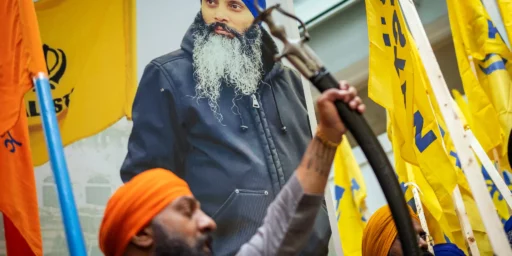Indian Court Issues Warrant to Arrest Richard Gere
An Indian Court has issued an arrest warrant for Richard Gere on a charge of obscenity.
An Indian court has issued an arrest warrant for Hollywood actor Richard Gere after he kissed Bollywood star Shilpa Shetty in public.
Gere, 57, kissed Shetty, 31, several times on the cheek at an Aids awareness event in Delhi earlier this month.
The court in Jaipur in Rajasthan state called it “an obscene act”, after a local lawyer filed a complaint.
For those who haven’t been following this story, Gere’s kissing of Shetty has sparked a great deal of outrage in India, where in many places public displays of affection are considered obscene.
Clearly, Gere didn’t intend any harm in kissing Shetty. Still, as someone who is, according to the article, a “regular visitor” of India, you would think that he would know better. Obviously, I don’t think he deserves time in prison–indeed, this is sort of playing out like a bad Next Generation episode. However, I do think that when a person is a visitor in another country, it’s only polite to not engage in behaviors that violate local customs. And certainly, someone should think twice before breaking their laws–no matter how trivial it might seem to us.
By the same token, I think it also goes without saying that although Gere’s gesture was considered obscene to many Indians, they are clearly overreacting. Especially considering that Gere is a guest in their nation. Again, basic politeness would dictate that a guest be given some level of grace in an instance like this–he should have been gently notified that his actions are considered impolite and the matter should have dropped after Gere apologized (which he did). That an arrest warrant has been issued against him is pretty unconscionable.






The Hindufascist scourge! Start a website devoted to the perfidy of them and their confusing, scheming gods!
I didn’t realize that the Indians were such movie fans.
But seriously, Mr. Gere’s exuberance is just another example of something I see all too much of from elites: the laws, including the obligations of a guest, pertain to everyone but them.
The authorities were going to let it slide until an attorney filed a complaint with the court forcing it to act. Customs may vary from place to place, but lawyers certailny don’t.
This may sound weird, but this actually reflects well on India. As William noted, the powers that be had come to a similar decision that Alex recommended. A gentle word to instruct Gere in the local customs, an apology by Gere and life goes on. But as part of the Anglo sphere, the rule of law is not the whim of the powers that be, rather it is the law. So when a duly constituted complaint is filed, it is not as we wish, but as the law is written.
Now the Indian legislature may decide to debate a new law, but any change will be done in a ‘lawful’ manner. I would much rather visit, work or otherwise interact in a country where the rule of law prevails, even if I didn’t particularly like certain laws.
To say ‘That an arrest warrant has been issued against him is pretty unconscionable. ‘ is to substitute your sensibilities for the rule of law. Fortunately, India is above such whims.
To say ‘That an arrest warrant has been issued against him is pretty unconscionable. ‘ is to substitute your sensibilities for the rule of law. Fortunately, India is above such whims.
Judicious and selective enforcement is also part and parcel of a just legal order. Or would you prefer that you got written a ticket every time you were pulled over for speeding, rather than merely getting off with a warning?
I might risk jail for a kiss from Shilpa.
yesanotherjohn: Your post makes perfect sense in a near-perfect world. I suspect, however, that you are unaware of the efforts of the fascist Hindu nationalist parties to subvert traditional laws by using the Indian constitution to achieve their own racist ends, also known as ‘Hindutva’. You may care to glance at the policies promoted by the BJP, which held the last parliament (now replaced by the Congress Party). Their attempts at rewriting history books was not well received by the majority of Indians. Even more to the point, Shiv Sena, complete with their brown uniforms and truncheons carries more than an echo of the German RS.
Whether it tearing down mosques or simply burning down villages, the Hindu nationalists do not particularly respect the rule of law, only the laws of which they approve.
Burgess,
I am not up on all the ins and outs of Indian politics. But what you raise is an interesting question of how to go about resisting the use of orderliness against us. Teddy Roosevelt had a problem as police commissioner in NYC. The police were taking bribes. One of the causes of the bribes was by saloon owners to get around a law closing them on Sundays. Teddy’s response was to enforce the law, despite the rantings and railings of the various interest groups. By forcing the law and its effects into the sunset he forced people to confront the law, its actual effects, the popular dissatisfaction with the law and the corroding effects of having a law but not enforcing it. As it is said, Teddy was enforcing a law that had hitherto been enforced dishonestly.
So how do you respond to a minority that wants to use the laws to achieve their own ends beyond the law? Expose it all to the sunlight. The law is on the books. To say you should enforce or not enforce a law because of how you feel about the group exercising the point of law is a dangerous step away from the rule of law and towards rule by personal prejudice. Put everything out into the open, including the motivations and behaviors of the suspect group.
In the US, we have the ‘flying Imams’ filing suit. Should we not give them their day in court because we suspect their motives? No. We should do the exact opposite and expose them through their own law suit. Perhaps a few counter suits for libel are also warranted. But not enforcing a law because you don’t like the group bringing the lawsuit helps that group show injustice much more than letting the lawsuit go forward.
Alex,
I agree that there is a point of discretion at different levels. In fact, the example of the policeman issuing a warning vs a ticket was the path originally taken in India. But if the law allowed for a private citizen to force the warning to be ignored and the speeding ticket issued with subsequent legal actions to followed, then you are past the traffic cops discretion. Change the law so a private citizen can’t force things to go further. Expose the private citizen to the light of public opinion for why they are pushing the issue. But the law remains the law.
Are you talking about Pelosi and the headscarf?
😉